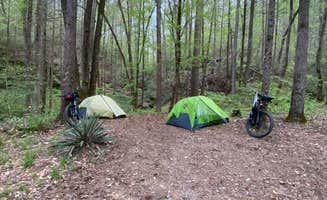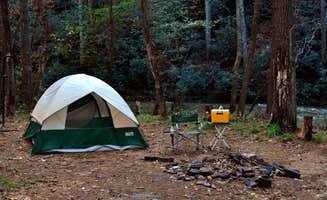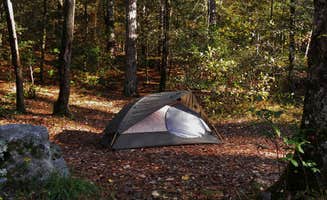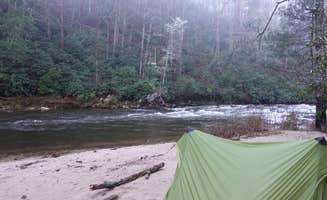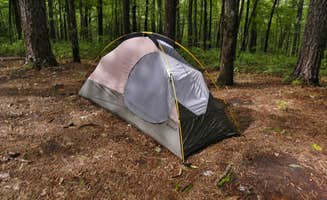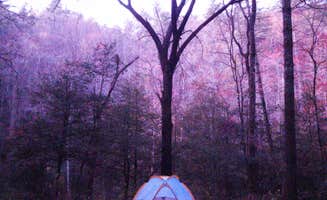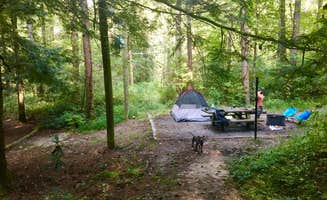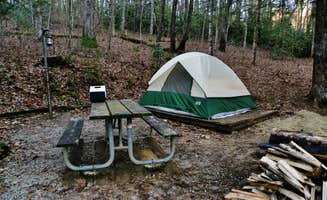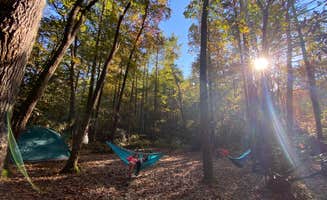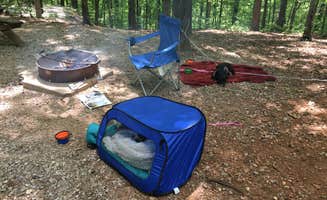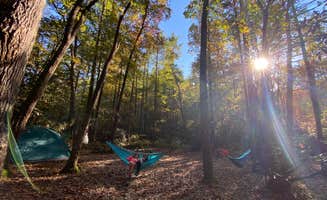Dispersed tent campsites near Westminster, South Carolina cluster around the Sumter National Forest's 85,000 acres, offering campers elevations between 800-2,000 feet. Primitive camping sites often feature forest road access with rocky, sometimes challenging terrain. Water sources typically run colder than expected even in summer months, requiring preparation for temperature fluctuations that can drop 15-20 degrees overnight.
What to do
Fishing access points: Burrells Ford Campground provides easy access to trout fishing on the Chattooga River. "Good amount of camping with a short hike in. Sites are right on the Chatooga River. This river is stocked with trout. Fishing license is required but both SC and GA are acceptable as the river is the state line," notes Jason D.
Waterfall hikes: Multiple trails connect tent sites to nearby waterfalls within 1-3 miles. "Short hike to King Creek Falls," mentions a Burrells Ford camper. Riley Moore Falls Campsite offers riverside sites with "great trout fishing" according to Austin G., who adds it's "a wonderful place to go and disconnect from everything."
Water recreation: During summer months, several camping areas provide swimming holes with clear, cold water. "We were right next to the river so we could hear the peaceful sounds all night," writes one camper about their experience. For paddlers, the Chattooga offers sections ranging from calm water to challenging rapids, though gear transport requires planning due to limited vehicle access at many sites.
What campers like
Privacy between sites: Unlike developed campgrounds, tent sites near Westminster offer substantial separation. At Blue Valley Dispersed Camping, "Beautiful, large, private sites. You couldn't see our site from the road, huge site, lots of woods surrounding for kids to play and explore, right beside a gorgeous large creek," reports Kristin S.
River proximity: Many campers specifically seek sites with running water nearby. "We were very secluded and there was very little traffic on the dirt road. Love hearing all the wonderful sounds of nature and nothing else. Wonderful creek/river by every campsite we went to," shares Kelli about Blue Valley.
Campfire setup: Most primitive sites include established fire rings despite minimal other amenities. At Grapevine, Ashley W. notes, "Spacious campsites (they have small picnic table and fire ring)." This is typical of many sites in the area, though some locations have better firewood gathering opportunities than others depending on visitor frequency.
What you should know
Access challenges: Many tent camping areas require high-clearance vehicles or hiking with gear. For Sumter National Forest Big Bend Campground, Myron C. warns, "It is accessible only by driving on a one and a half mile forest road that is rough with lots of rocks and pot holes. You cannot drive to this site with a low clearance sedan."
Water sources: Bring filtration systems or sufficient water supplies. "You have to backpack in and take everything you need. Make sure to take lots of water or a good water filter," advises a camper about water availability. Many creeks run year-round but turbidity increases after rainfall.
Temperature variations: Prepare for significant overnight cooling even in summer. "It was cool in day and cold at night," reports Linda F. about Blue Valley in July. Temperature differentials of 20+ degrees between day and night are common, especially at higher elevation sites.
Wildlife considerations: Bear activity requires proper food storage at all sites. "There was also a hanging system for food since this place is in bear country," one camper notes. Some established areas provide bear cables, but most dispersed sites require bringing your own rope for hanging food supplies.
Tips for camping with families
Easy access sites: For families with young children, seek drive-up sites near restroom facilities. Panther Creek Recreation Area Camping offers options where "you can drive in and park and hike a small bit to a spot near the river (this parking lot has a community pit toilet)," according to Melissa R.
Weather readiness: Family camping requires preparation for rapid weather changes. Christy C. recounts, "It dropped to 17 degrees and our plan to stay in 2 tents quickly changed to everybody in the 4-man / 3-season tent that we had just purchased." Always pack additional layers regardless of forecast.
Creek exploration: Shallow water features provide natural entertainment for children. "Lots of woods surrounding for kids to play and explore, right beside a gorgeous large creek," highlights one family about their experience at primitive sites in the area.
Tips from RVers
Road conditions: RV access is severely limited to a few designated areas. At Jocassee Gorges Wildlife Management Area, Candy H. cautions, "Not big rig friendly. Small campground loop." Forest roads typically cannot accommodate vehicles longer than 20 feet.
Limited hookups: RVers should prepare for dry camping with minimal amenities. "No water spigots, bathrooms, or amenities other than a fire ring, and cell service is spotty so this is truly a down-to-basics getaway," explains Erica about Jocassee Gorges campsites.
Alternate basecamp options: Consider established campgrounds as basecamps for day trips to more remote areas. Several reviewers mention using larger campgrounds with better RV access as home bases while exploring primitive sites during daylight hours.


